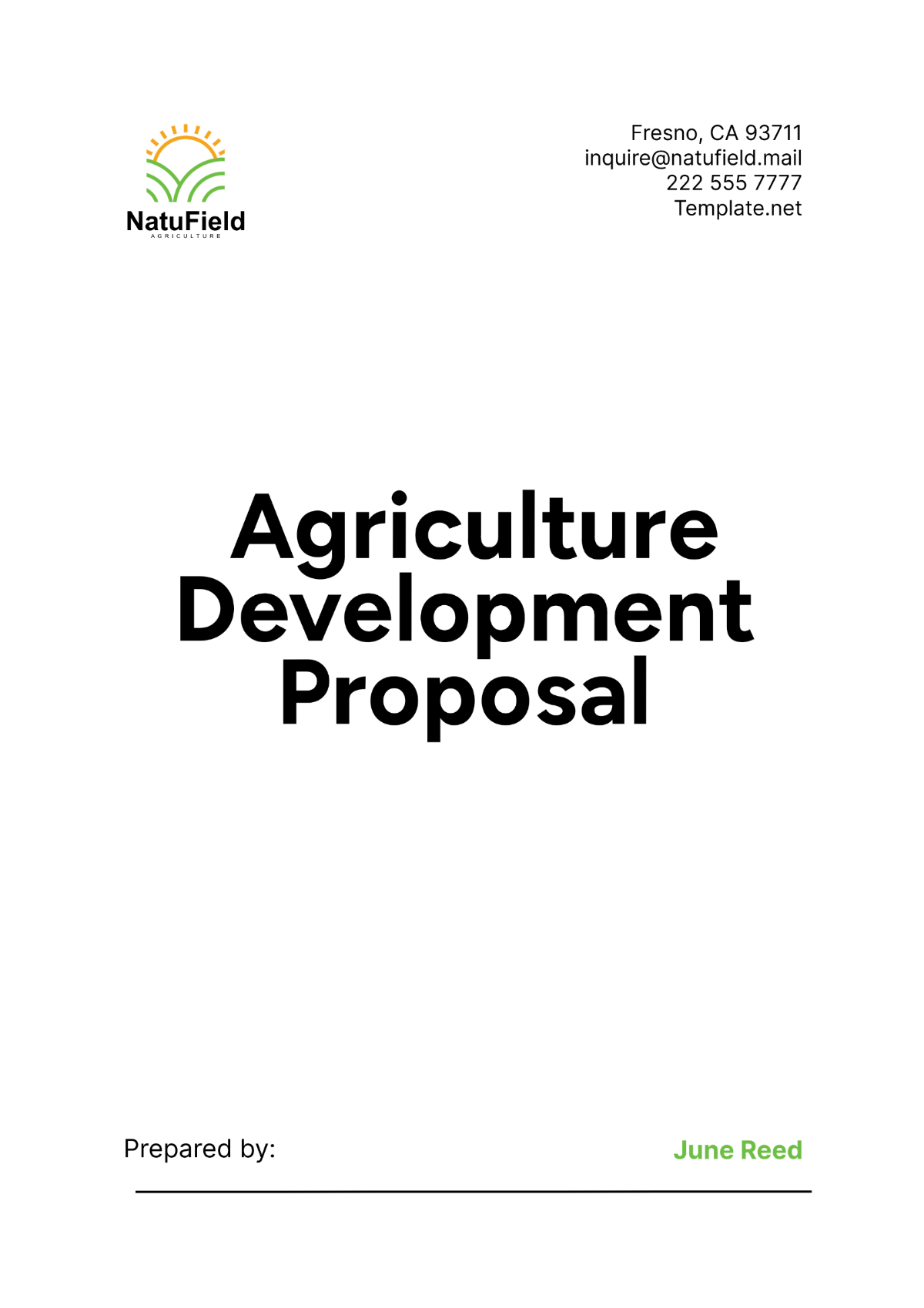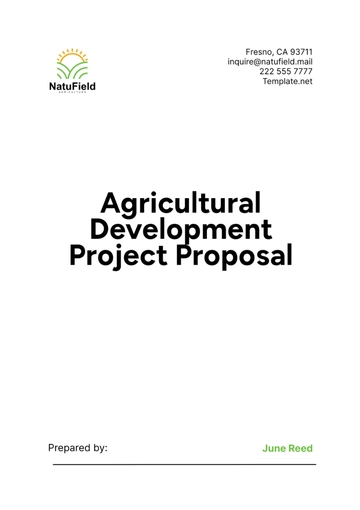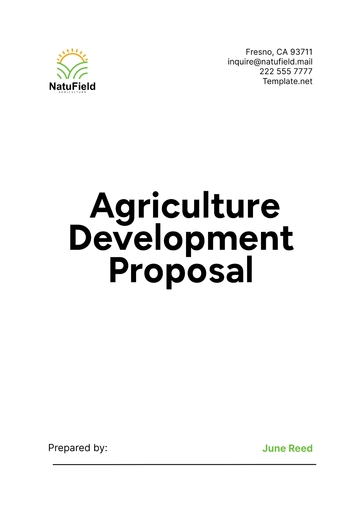Free Agriculture Development Proposal

I. Introduction
Agriculture is the backbone of our nation's economy, providing essential resources and sustenance to the population. As we face increasing challenges such as climate change, population growth, and resource scarcity, it is crucial to develop sustainable and innovative agricultural practices. This proposal outlines a comprehensive plan for the development of [Your Company Name], aiming to enhance productivity, improve environmental stewardship, and ensure economic viability. By integrating advanced technologies, adopting sustainable farming methods, and fostering community partnerships, we seek to create a model of modern agriculture that can serve as a benchmark for others in the industry.
At [Your Company Name], we are committed to aligning with US agricultural standards and regulations, ensuring that our practices meet the highest levels of safety, sustainability, and efficiency. We will focus on key areas such as crop diversification, soil health, water management, and renewable energy utilization. Through these initiatives, we aim to increase yields, reduce environmental impact, and contribute to the overall well-being of the agricultural sector. This proposal provides a detailed roadmap for achieving these goals, including specific strategies, timelines, and measurable outcomes. By investing in the future of agriculture, we not only secure the success of [Your Company Name] but also contribute to the resilience and sustainability of the wider agricultural community.
II. Company Overview
[Your Company Name] was founded in [2050] with the mission to advance sustainable agricultural practices and deliver high-quality produce to our community. Located in [Your Company Address], we operate on [500] acres of fertile farmland, where we have established a diverse range of crops and innovative farming systems. Our core values of innovation, sustainability, and community engagement guide every aspect of our operations, from soil management to market strategies. Over the years, we have built a reputation for excellence and reliability in the agricultural sector, driven by a dedicated team and a commitment to environmental stewardship.
Our farm specializes in organic fruits and vegetables, including tomatoes, lettuce, strawberries, and avocados. We cultivate these products using a combination of traditional farming methods and advanced technologies such as precision agriculture, drip irrigation systems, and integrated pest management. Our state-of-the-art facilities include a modern greenhouse for research and development, a water recycling system to conserve resources, and a high-efficiency packing house to ensure product quality and freshness. These innovations enable us to maintain high yields while minimizing our ecological footprint.
Looking ahead, [Your Company Name] is focused on expanding our operations and increasing our impact within the agricultural industry. We are pursuing several strategic initiatives aimed at enhancing productivity, advancing sustainability, and building strong partnerships with local and national stakeholders. Our vision is to be a leader in modern agriculture, setting a standard for innovation and excellence that others in the industry will strive to achieve. Planned projects include the expansion of our greenhouse facilities, the implementation of advanced soil health monitoring systems, and the development of new organic product lines. By investing in these areas, we aim to meet the growing demand for sustainable agricultural solutions and contribute to the long-term success of the industry.
III. Project Objectives
To achieve a thriving and sustainable agricultural future, [Your Company Name] has established four key objectives for this development initiative. These goals are designed to drive progress in farming practices and support the broader agricultural community.
Our objectives are:
Increase agricultural productivity through the use of modern technology.
Implement sustainable farming practices to protect the environment.
Enhance economic viability for local farmers.
Provide training and education to farmers on innovative practices.
IV. Proposed Initiatives
To achieve the objectives outlined in this proposal, [Your Company Name] is implementing a series of strategic initiatives. These initiatives are designed to enhance agricultural productivity, promote sustainability, support local farmers, and provide essential training and education. Below are the key initiatives along with detailed descriptions and expected outcomes.
1. Advanced Technology Adoption
We will invest in cutting-edge agricultural technologies to increase productivity and efficiency. This includes the implementation of precision farming tools, such as GPS-guided tractors and drones for crop monitoring. Additionally, we will integrate advanced irrigation systems that use sensors to
Phase | Expected Outcomes | Timeline |
|---|---|---|
Phase 1: Research and procurement | Increased crop yields and reduced operational costs. | Month 1-2 |
Phase 2: Installation and testing | Enhanced ability to monitor and respond to crop health issues. | Month 3-4 |
Phase 3: Full-scale implementation | More efficient water management practices. | Month 5-6 |
2. Sustainable Farming Practices
We will adopt and promote sustainable farming practices that minimize environmental impact. This includes the use of organic fertilizers, the implementation of cover cropping to prevent soil erosion, and the establishment of integrated pest management (IPM) systems.
Phase | Expected Outcomes | Timeline |
|---|---|---|
Phase 1: Development of practices and training materials | Improved soil health and reduced environmental pollution. | Month 1-3 |
Phase 2: Implementation on test plots | Enhanced ability to monitor and respond to crop health issues. | Month 4-6 |
Phase 3: Expansion to full farm operations | Long-term sustainability of farming practices. | Month 7-12 |
3. Economic Support for Local Farmers
We will develop programs aimed at enhancing the economic viability of local farmers. This includes creating a cooperative marketing platform, offering financial assistance for farm improvements, and establishing a support network for sharing best practices.
Phase | Expected Outcomes | Timeline |
|---|---|---|
Phase 1: Program design and stakeholder engagement | Increased market access and better pricing for local farmers. | Month 1-3 |
Phase 2: Launch of support programs | Financial support for farm upgrades and operational costs. | Month 4-6 |
Phase 3: Ongoing support and evaluation | A strengthened network of local agricultural producers. | Month 7-12 |
V. Expected Outcomes
The proposed initiatives for [Your Company Name] are designed to achieve significant and measurable improvements across various aspects of agricultural operations. By focusing on advanced technologies, sustainable practices, and comprehensive support for local farmers, we anticipate a range of positive outcomes that will benefit both the environment and the farming community. The following outlines the expected results of our strategic efforts:
Increased Crop Yields and Farm Productivity
One of the primary expected outcomes of our initiatives is a significant increase in crop yields and overall farm productivity. Through the adoption of advanced technologies such as precision farming tools, GPS-guided tractors, and state-of-the-art irrigation systems, we aim to enhance crop management and operational efficiency. These technologies will enable more accurate planting, efficient water usage, and timely harvesting, resulting in higher yields per acre and increased farm productivity. As a result, farmers will experience a notable boost in their output and operational efficiency, leading to a more productive agricultural sector.
Reduction in Environmental Impact from Farming Activities
Another crucial outcome of our project is the reduction of the environmental impact associated with farming activities. By implementing sustainable farming practices, including the use of organic fertilizers, cover cropping, and integrated pest management (IPM) systems, we are committed to minimizing pollution and conserving natural resources. These practices will help improve soil health, reduce reliance on synthetic chemicals, and optimize water usage, contributing to a healthier environment and a more sustainable agricultural model.
Enhanced Economic Returns for Farmers
Our initiatives are also designed to enhance the economic returns for local farmers. By creating a cooperative marketing platform, offering financial assistance for farm improvements, and establishing a support network, we aim to provide farmers with better market access and increased profitability. These efforts will help farmers reduce costs, improve their financial stability, and expand their market opportunities, leading to enhanced economic outcomes for the farming community.
A Well-Informed and Technologically Adept Farming Community
Finally, we anticipate fostering a well-informed and technologically adept farming community through our comprehensive training and education programs. These programs will offer workshops, seminars, and online resources to equip farmers with the knowledge and skills needed to adopt innovative practices and technologies. By focusing on education and training, we aim to empower farmers with the latest agricultural techniques and tools, ensuring they are well-prepared to meet future challenges and opportunities in the agricultural sector.
VI. Budget and Financial Plan
A comprehensive and well-structured budget is essential for the successful implementation of our proposed agricultural development initiatives. [Your Company Name] has developed a detailed financial plan to ensure that all aspects of the project are adequately funded and managed. This budget outlines the estimated costs for each initiative, providing a clear breakdown of how the $[0] investment will be allocated to achieve our strategic goals.
Our financial plan focuses on four main areas: the adoption of modern technology, the implementation of sustainable farming practices, economic support for local farmers, and the development of training and education programs. Each area has been carefully budgeted to ensure that resources are used effectively and that we achieve the desired outcomes.
Below is the detailed budget allocation for the proposed initiatives:
Initiative | Estimated Cost |
|---|---|
Adoption of Modern Technology | $[0] |
Sustainable Farming Practices | $[0] |
Economic Support and Incentives | $[0] |
Training and Education Programs | $[0] |
VII. Conclusion
In conclusion, the strategic initiatives outlined in this proposal for [Your Company Name] represent a comprehensive approach to advancing agricultural practices and supporting the local farming community. Our proposed plan, with its focus on adopting modern technology, implementing sustainable farming practices, and providing robust economic and educational support, is designed to drive meaningful improvements in agricultural productivity and environmental stewardship. By investing $[0] in these initiatives, we are committed to creating a positive impact that extends from increased crop yields and reduced environmental harm to enhanced economic opportunities for farmers and a well-informed farming community.
Our vision is to transform the agricultural sector through innovative solutions and collaborative efforts. We believe that by focusing on these key objectives, we can not only address current challenges but also set the stage for long-term success in agriculture. The expected outcomes of this proposal will foster a resilient and thriving agricultural industry, where technology and sustainability go hand in hand with economic growth and community development. We look forward to the opportunity to implement these initiatives and work together towards a more prosperous and sustainable future for the agricultural community.
- 100% Customizable, free editor
- Access 1 Million+ Templates, photo’s & graphics
- Download or share as a template
- Click and replace photos, graphics, text, backgrounds
- Resize, crop, AI write & more
- Access advanced editor
Drive your projects forward with the Agriculture Development Proposal Template from Template.net. This fully customizable and editable template is ideal for presenting your development plans. Easily editable in our Ai Editor Tool, you can tailor it to your specific needs, ensuring a comprehensive and professional proposal for your agricultural initiatives.
You may also like
- Business Proposal
- Research Proposal
- Proposal Request
- Project Proposal
- Grant Proposal
- Photography Proposal
- Job Proposal
- Budget Proposal
- Marketing Proposal
- Branding Proposal
- Advertising Proposal
- Sales Proposal
- Startup Proposal
- Event Proposal
- Creative Proposal
- Restaurant Proposal
- Blank Proposal
- One Page Proposal
- Proposal Report
- IT Proposal
- Non Profit Proposal
- Training Proposal
- Construction Proposal
- School Proposal
- Cleaning Proposal
- Contract Proposal
- HR Proposal
- Travel Agency Proposal
- Small Business Proposal
- Investment Proposal
- Bid Proposal
- Retail Business Proposal
- Sponsorship Proposal
- Academic Proposal
- Partnership Proposal
- Work Proposal
- Agency Proposal
- University Proposal
- Accounting Proposal
- Real Estate Proposal
- Hotel Proposal
- Product Proposal
- Advertising Agency Proposal
- Development Proposal
- Loan Proposal
- Website Proposal
- Nursing Home Proposal
- Financial Proposal
- Salon Proposal
- Freelancer Proposal
- Funding Proposal
- Work from Home Proposal
- Company Proposal
- Consulting Proposal
- Educational Proposal
- Construction Bid Proposal
- Interior Design Proposal
- New Product Proposal
- Sports Proposal
- Corporate Proposal
- Food Proposal
- Property Proposal
- Maintenance Proposal
- Purchase Proposal
- Rental Proposal
- Recruitment Proposal
- Social Media Proposal
- Travel Proposal
- Trip Proposal
- Software Proposal
- Conference Proposal
- Graphic Design Proposal
- Law Firm Proposal
- Medical Proposal
- Music Proposal
- Pricing Proposal
- SEO Proposal
- Strategy Proposal
- Technical Proposal
- Coaching Proposal
- Ecommerce Proposal
- Fundraising Proposal
- Landscaping Proposal
- Charity Proposal
- Contractor Proposal
- Exhibition Proposal
- Art Proposal
- Mobile Proposal
- Equipment Proposal
- Student Proposal
- Engineering Proposal
- Business Proposal






